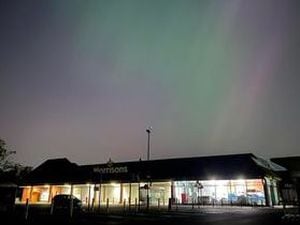Sylvia plays down secret war-time role
A precious document that recognises the work of 87-year-old Sylvia Simkins in helping to break Nazi Germany's military codes during the Second World War almost ended up in a Staffordshire shredding machine.


The Rugeley pensioner is one of the few surviving veterans of Bletchley Park in Buckinghamshire, where Britain's top secret code-breaking team were based.
Earlier this month former colleagues gathered at GCHQ in Cheltenham, Bletchley's modern replacement, to receive commemorative badges from Foreign Secretary David Miliband in recognition of their work.
Many historians agree the codebreakers' efforts shortened the war by two years.
But the modest mother-of-one, who was engaged in cracking the German Enigma code, has always shrugged off her contribution and in a recent clear-out placed a glowing Foreign Office reference about her work at Bletchley Park among paperwork to be shredded before it was retrieved by her son Graham.
Mr Simkins, of Market Street, Rugeley, said: "I couldn't believe it. The letter should be framed and hanging on the wall but instead she wanted to throw it out. She doesn't see the point in hanging on to it."
The reference, on Foreign Office notepaper, states that Sylvia, a temporary assistant on £4-7s-0d a week, was employed "on important and highly specialised work of a secret nature".
It also praises her work during more than three years with the department, which she performed in "a very satisfactory manner".
About 10,000 people worked on breaking codes during the war, of whom around 1,500 are still alive.
Brought up in the East End of London, Sylvia was 17 when she was evacuated to Kent at the outbreak of war. Two years later she was sent to Bletchley Park after her bid to join the Women's Royal Naval Service failed through lack of vacancies.
She said of Bletchley: "We worked in shifts 24 hours round the clock and lived on site, later being billeted to nearby to live with local families.
"I worked on decoding the Enigma for intelligence service use. We didn't realise how important our work was at the time.
"We just accepted we couldn't talk about what we did, even to our own families when on leave."
Sylvia later moved to the Midlands after marrying Charles Simkins, of Hagley Road, Rugeley, who was stationed near Bletchley.
She had one son and worked in a variety of secretarial and managerial posts, starting out at the offices at Brereton Colliery and was later employed by Don and Roy Richardson.
Mr Miliband said the Bletchley staff made a decisive contribution to the actions Britain took on the battlefield. But Sylvia does not want any badges. She said: "It was all a long time ago."





